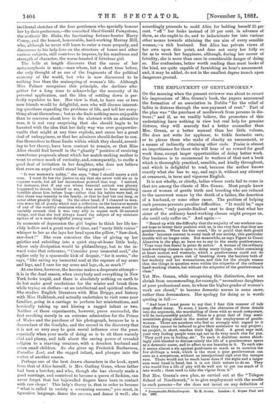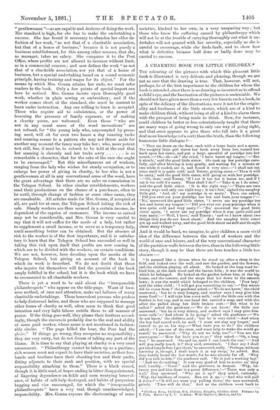THE EMPLOYMENT OF GENTLEWOMEN.* ON the morning when the present
reviewer was about to record his impressions of Mrs. Genna's book, the papers announced the formation of an association in Dublin "for the relief of ladies in distress through the non-payment of rent." Part of the plan was "the purchase of needlework from persons in dis- tress ;" and if, as we readily believe, the promoters of this undertaking have nothing in view but real help for genuine distress, they will scarcely find a better counsellor than Mrs. Genna, or a better manual than her little volume. She does not write for applause, to tickle fantastic ears, or to please those who make of charity an amusement, or a means of indirectly obtaining other ends. Praise is almost an impertinence for those who will hear of no reward for good work done, except larger opportunities of doing better work. Our business is to recommend to workers of that sort it book which is thoroughly practical, sensible, and kindly throughout,.
and which is delightful to read, because the author knows exactly what she has- to say, and says it, without any attempt at ornament, in terse and vigorous English.
It is not wholly, or chiefly, ladies whose rents fail to come that are among the clients of Mrs. Genna. Most people know cases of women of gentle birth and breeding who are reduced to the narrowest means by the death of a father, the desertion of a husband, or some other cause. The problem of helping such persons presents peculiar difficulties. "It would be," says our author, "only pseudo-Radical cant to deny that what her sister of the ordinary hand-working classes might prosper on, she could only suffer on." And again
"Bound up with the difficulty that the majority of our workers can- not hope to better their position with us, is the very fact that they are- gentlewomen. When the fine creed, He is gentil that doth gentil deedes ' becomes current in every rank of our society, this particular trouble will no longer exist. But meanwhile, as says Figaro to Comet Almaviva in the play, so have we to say to the needy gentlewomen,. Vous vous etes donne in peine de naltre.' A woman of the ordinary hand-working classes is open to doing many things, whilst remaining at heart modest and womanly, which a gentlewoman could not do. without running grave risk of breaking down the barriers both of her modesty and her womanliness, and this for the simple reason that the things in question were within the etiquette of the ordinary hand-working classes, but without the etiquette of the gentlewoman's. class."
Yet Mrs. Genna, while recognising this distinction, does not shrink from recommending, for example," necessitous daughters of poor professional men, to whom the higher grades of women's work are closed," to become domestic nurses in some cases,. rather than dressmakers. Her apology for doing so is worth.
quoting in fall :—
"And here I must pause to say that I fear this manner of talk may offend many. To sorae, I know, the obtrusion of these detail& into the argument, the marshalling of them with so much composure, will be inexpressibly painful. There is a great deal of limp senti- mentalism going about in the matter of the employment of gentle- women. There are numbers who feel so strongly with regard to it that they cannot be induced to give their assistance to any project ; no project, in short, reaches their high ideal. A great sage said, your very feeling people were apt not to do very much else for you. They paid you in feeling, sir.' To such it doubtless seems shock- ingly cold-blooded to discuss calmly the life of a gentlewoman spent as a domestic nurse, and to affect to see beauties in it. To such also. it seems almost a sin against good-taste so much as to mention the few shillings a week, which is the most a poor gentlewoman can earn as a sempstress, without an interjectional sigh over the meagre sum. There would not be much harm done if the sighs and a larger- sum went hand in hand, but it is not their nature to do so. They who would live a life of pity will do well not to put too mach of it into words ; these tend to take the vigour from it."
But Mrs. Genna's own plan, as carried out at the " Telegon School of Needlework," is to give employment with the needle to such persons—for she does not insist on any definition or
* Irresponsible Philanthropists. By E. Genus. London : C. Kegan Paul and. CO. 1881.
"gentlewomen "—as are capable and desirous of doing the work. Her standard is high, for she has to make the undertaking a success. She has found it necessary to abandon her older de- finition of her work, "as not that of a charitable association, but that of a house of business," because it is not purely a business establishment, for this among other reasons, that she, as manager, takes no salary. She compares it to the Post Office, where profits are not allowed to increase without limit, as in a commercial concern ; and now defines the work "as not that of a charitable association, nor yet that of a house of business, but a special undertaking based on a sound economic principle, having training and wages for its object." For the means by which Mrs. Genna attains her ends, we must refer readers to the book. Only a few points of special import can here be noticed. Mrs. Genna insists upon thoroughly good work, whether in plain sewing or embroidery ; and if the worker comes short of the standard, she must be content to learn under instruction. Any one willing to learn is accepted. Those who require aid to subsistence, or the power of lessening the pressure of family expenses, or of making a charity purse, are welcomed. Even those " who are not in any usual sense of the word necessitous" are not refused, for "the young lady who, unprompted by press- ing need, will sit for even two hours a day running tucks and. seaming seams to a pattern she may not throw aside for another any moment the fancy may take her ; who, more potent test still, has, if need be, to submit to be told at the end that
her seaming is slovenly and her tucks awry is so remarkable a character, that for the sake of the race she ought to be encouraged." But this miscellaneous set of workers, ranging from the lady who wishes for steady occupation, or to enlarge her power of giving in charity, to her who is not a gentlewoman at all in any conventional sense of the word, have the great advantage that there are no sales on commission in the Telegon School. In other similar establishments, workers send their productions on the chance of a purchaser, often to lie until, through change of fashion or some other cause, they are unsaleable. All articles made for Mrs. Genna, if accepted at all, are paid for at once, the Telegon School taking the risk of sale. Steady workers are thus secured in a certain income, in- dependent of the caprice of customers. The income so earned may not be considerable, and Mrs. Genna is very careful to say that it will not suffice for the needs of a lady, but rather to supplement a small income, or to serve as a temporary help, until something better can be obtained. But the absence of risk to the worker is of the first importance, and it is satisfac- tory to learn that the Telegon School has succeeded so well in taking this risk upon itself that profits are now coming in, which are to be divided with the workers, on certain conditions. We are not, however, here deciding upon the merits of the Telegon School, but giving an account of the book in which its work is described. We do not doubt that those who inquire for themselves will find the promise of the book amply fulfilled in the school, but it is the book which we have to recommend to all charitable workers.
There is yet a word to be said about the "irresponsible philanthropists" who appear on the title-page. Want of busi- ness method, of care and attention, make sad failures of many charitable undertakings. Those benevolent persons who profess to help distressed ladies, and those who are supposed to manage other forms of charity as well, often seem to think that good intention and very light labour entitle them to all manner of praise. If the thing goes well, they plume their feathers accord- ingly, though the success is probably due to the zeal and ability of some paid worker, whose name is not mentioned in fashion- able circles. "The page killed the boar, the Peer had the gloire." If things go wrong, they recognise no responsibility ; they are very sorry, but do not dream of taking any part of the blame. It is time to say that playing at charity is a very cruel amusement. "Philanthropy cannot be taken up as a pastime ; rich women must not expect to have their societies, as their hus- bands and brothers have their shooting-box and their yacht, fitting adjuncts to their rank and position, with no special responsibility attaching to them." There is a black record, though it is little read, of hopes ending in bitter disappointment, of lingering dependence on fickle and soon wearying benevol- ence, of habits of self-help destroyed, and habits of pauperism begging and vice encouraged, for which the "irresponsible philanthropists" have a very real, though unacknowledged, responsibility. Mrs. Genna exposes the shortcomings of some
societies, kindred to her own, in a very unsparing way ; but those who know the suffering caused by philanthropy which will not be at the trouble of carrying thoroughly out what it un- dertakes will not quarrel with her severity, especially as she is careful to encourage, while she finds fault, and to show how what is defective because half done or badly done may be carried to success.



































 Previous page
Previous page